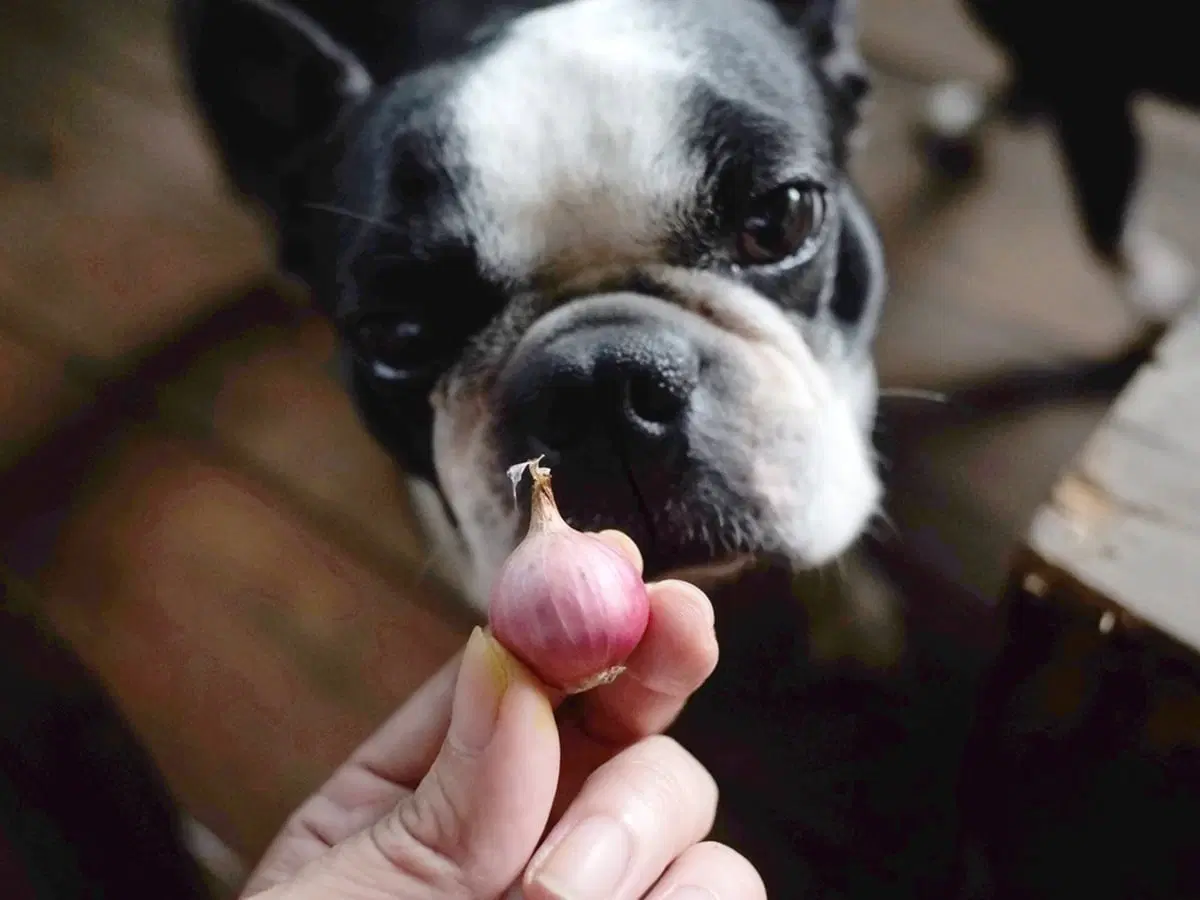As a good pet parent, you’re always on the lookout for things that could hurt your dog. Toxic foods are especially difficult to keep track of. After all, some human foods can be bad for dogs and other animals, as your veterinarian has probably told you.
You may have heard that onions can hurt your pup, even causing something called onion poisoning in some cases. Now you have a multitude of questions about your dog and onions. How much does it take? How does it harm my dog? How can I protect my dog?
Don’t worry! Our team at Spot Pet Insurance is here to help! We want to give you the information you need to be a great pet parent, so you have help preventing emergency visits to the vet.
Onions and other members of the allium family like shallots and leeks may be full of nutrients for us humans, but they can hurt our dogs. Don’t worry too much, though! There are plenty of easy ways to prevent your dog from eating an onion.
Why are onions toxic to dogs?
Not all toxic foods will cause the same issues, which is why the vet needs to know what your dog may have eaten. Onions and other plants in the same family (like garlic) contain a toxic compound called n-propyl disulfide.
Although we can safely consume onions and other plants with this toxin, dogs cannot. Generally, eating onions and their relatives causes gastroenteritis, an inflammation of parts of the digestive tract. That applies to all parts of the onion, including the flesh, leaves, juice, and foods made with onions as ingredients like soups.
If your dog consumes and digests a large amount of onions; however, the n-propyl disulfide can cause hemolytic anemia. It also prevents your dog’s red blood cells from transporting enough oxygen from the lungs to the rest of the body.
What is hemolytic anemia?
Anemia is a condition where there aren’t enough red blood cells in the blood. There are many different types of anemia because there are many potential reasons for a dip in a dog’s red blood cell count.
Hemolytic anemia happens when your dog’s body destroys too many red blood cells. The n-propyl disulfide attaches to oxygen molecules and causes the red blood cells to rupture before being removed from the blood. This condition can appear in us humans too, but it isn’t usually caused by eating onions. The process is also known as hemolysis.
Depending on the severeness of the anemia, your puppy might need a blood transfusion and oxygen for a bit. The earlier you can see a vet, the better.
How many onions does it take to harm my dog?
Although it is best to see a vet if your dog has gotten into your store of onions or managed to nab some seasoned chicken from the counter, it’s good to know the amount of onion that can harm your dog.
Certain breeds are more susceptible to the effects of onions, including Japanese breeds like Shiba Inu and Akita.
If a dog eats more than 0.5 percent of their body weight in onions, there is a good chance it will negatively affect them. A 40-pound dog will be affected by eating 0.2 pounds (3.2 ounces/1 cup) of onion. This means that a medium-sized onion could harm them.
You may be wondering if the same rules apply to onion powder. Onion powder is actually more toxic than a full onion. How can that be?
Although onion powder seems like it would be less toxic, its powder form means that the toxin is more concentrated than in an onion. The smaller mass means there is less area for the toxin to spread out in, causing it to be more compact. The same rule applies to dried onions.
Are cooked onions okay?
Unfortunately, no. Your dog cannot have onion in any form, cooked or otherwise. You may feel sad that your dog cannot experience the wonders of dishes cooked with onions. Rest assured they are perfectly happy and content with whatever you provide for them.
What are the symptoms of onion toxicity?
Say you were out one day, and your dog thought it was a great opportunity to try some new foods from your garden or kitchen cabinets. Perhaps you were on a walk, and your dog got a hold of some plant. You couldn’t tell what it was, but your pup didn’t seem to have initial problems.
How can you tell if your dog might be suffering from onion toxicity? If your dog didn’t eat enough to cause hemolytic anemia yet, the gastroenteritis might cause:
Diarrhea
Excessive drooling
Lethargy
Lack of coordination
Dermatitis
Liver damage
Symptoms of hemolytic anemia include:
Red or brown urine
Fainting
Excessive sleepiness
Pale gums
Lack of appetite
An elevated heart rate
Vomiting
Panting
If your pup has any of these symptoms, you should probably take them to the vet as there could be a chance that your dog at onion. If it’s one of the more normal symptoms (like panting), keep a close eye on your pup to see if there are any others.
My dog accidentally ate onions; what do I do?
If you think your dog ate some onions, the best course of action is to take them to an emergency vet.
The vet will most likely pump your dog’s stomach with activated charcoal to remove the onions before they can cause too many issues. They may also give your pet intravenous fluids to maintain hydration and flush out your pup’s bloodstream. In serious cases, your pet may need oxygen supplementation.
Your vet can also give you advice on what to look out for so that your dog can heal well.
How can I keep my dog safe from onions?
To protect your dog from onions, you must learn how to protect your dog from themselves. Dogs can have a tendency to see or smell a dish on the counter or table. If it’s within their reach, they will do their best to retrieve the delicious treat.
Store onions up high so your dog can’t get to them. If you cook a dish with onion or onion powder, make sure to keep it away from the edges of the counter or the table. This also goes for store-bought dishes; they may contain onion powder. It’s best to keep your dog away from it.
This can also be true of items like baby food! Always check your food labels, especially if you have messy little ones who like to share with the dog by throwing food on the floor.
Store-bought dog food is, of course, safe for your four-legged child. If you want to make dishes for your dog, make sure to avoid onions. They’ll love it even without the hint of onion we humans like! After all, you made it for them. Your love is all that matters to them!
If you have a garden with onions, you should make it secure with a dog-proof fence. Depending on your dog’s breed, they may figure out a way to get into your garden, whether by digging, jumping, or maybe even opening the gate.
Just like parents need to baby-proof a house to prevent their little one from getting into things they shouldn’t, you need to doggy-proof your home to protect your canine companion from their curiosity.
In addition, it’s worth noting that there are plenty of other veggies that your dog can eat as a treat. These include:
Carrots
Cucumbers
Green Beans
Keeping your pup safe, one post at a time
The first step to being a good pet parent is to learn what is good for your pup and what is bad for them. Onions are definitely part of the second group. That means that to keep your dog safe, you need to keep them away from onions.
The toxic components of onions can cause gastrointestinal issues and hemolytic anemia if eaten in large enough amounts. It takes only one medium-sized onion to cause these issues for a 40-pound dog, and even small amounts of onion powder can cause problems.
If you think your dog may have eaten an onion, it’s probably best to take them to a vet, especially if they show symptoms like vomiting or a decreased appetite. Your vet can help remove the onion before it causes too much damage and can assess what treatment your dog might need.
You may be feeling a little bit more anxious about the onions in your home, but as long as you dog-proof your house, the likelihood of your fur-baby having to go through such an ordeal is very small. You can protect your dog, just as they protect you.
Owning a pet is a huge responsibility. There are a lot of things that you have to keep track of in order to keep your pet safe. It can be overwhelming at times. We at Spot Pet Insurance want to help ease your burden by providing educational materials for your pet needs.
There is one thing you don’t need to worry about, though. You are your pup’s world, and they appreciate everything you do!
What Other Vegetables Can Dogs Eat?
Though our canine companions cannot enjoy every food we can, several veggies are safe for dogs and humans. We have compiled a list of all vegetables that dogs can eat for you! Dogs can eat various veggies you might have on hand, such as sweet potatoes, cabbage, eggplant, radishes, carrots, beets, corn, peas, potatoes, ginger, squash, pumpkins, zucchini, and so many more! All vegetables offer different nutritional values and benefits, so it’s always a good idea to introduce your dog to different vegetable types.

I've had the privilege of immersing myself in the realm of pet safety. As the owner of an energetic mini golden doodle, I know just how stressful being a pet owner can be. I am dedicated to ensuring our beloved pets enjoy a life brimming with good health.
*Jan 2019 to Aug 2024 administrator claims data.
1. “Can Dogs Eat Onions? Everything You Need to Know.” American Kennel Club, 7 May 2024, www.akc.org/expert-advice/nutrition/can-dogs-eat-onions/
2. “Onion, Garlic, Chive, and Leek Toxicity in Dogs | VCA Canada Animal Hospitals.” VcaCanada, no date, vcacanada.com/know-your-pet/onion-garlic-chive-and-leek-toxicity-in-dogs
3. “Onion.” ASPCA, no date, www.aspca.org/pet-care/animal-poison-control/toxic-and-non-toxic-plants/onion.
4. “Anemia - Hemolytic Anemia | NHLBI, NIH.” Www.nhlbi.nih.gov, 24 Mar. 2022, www.nhlbi.nih.gov/health/anemia/hemolytic-anemia.
The information presented in this article is for educational and informational purposes only and does not constitute or substitute for the advice of your veterinarian.












